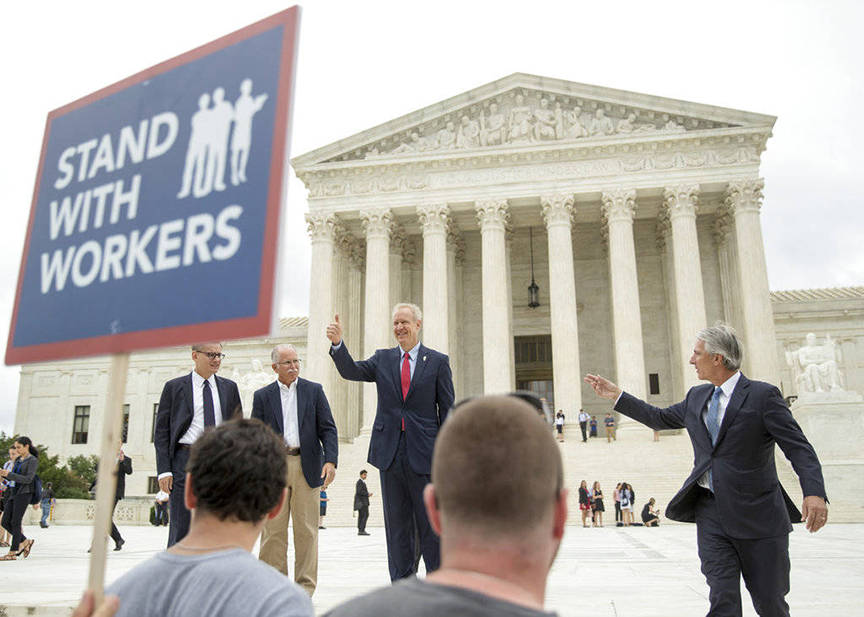The State of Alaska is not in compliance with the U.S. Supreme Court regarding state employee payments toward unions, according to an opinion released by Alaska Attorney General Kevin Clarkson Tuesday.
But union leaders see the ruling as another attempt to undermine collective bargaining power.
The opinion is “just another attempt by the Dunleavy administration to stifle workers’ constitutional rights on the job,” Jake Metcalf, executive director of the Alaska State Employees Association (ASEA), told the Empire by phone Tuesday.
Clarkson’s opinion states that the current process whereby a State of Alaska employee must choose to opt-out of union dues or fees is a violation of free speech, citing the U.S. Supreme Court’s Janus v. American Federation of State, County, and Municipal Employees Council 31. That 2018 decision says because unions engage in political activity employees might not agree with, making non-union employees contribute to unions either through dues or agency fees violated their right to free speech.
The state’s current “opt-out” violated the First Amendment under the U.S. Supreme Court’s ruling in Janus, Clarkson said, because it automatically includes union deductions for public employees. Employees must instead choose to “opt-in” to union contributions, Clarkson’s opinion states. Furthermore, sufficient evidence that “those consents are knowing, intelligent, and freely given,” must be provided to the state and updated regularly, the ruling said.
“Forcing State employees through state law to pay union dues that will be used for political purposes and speech they may not agree with has created an unconstitutional restriction of free speech,” Clarkson said in a press release.
“The nation’s highest court has ruled repeatedly that freedom of speech also means the right to refrain from speaking at all,” Clarkson said in a statement. “In order to comply with the highest court’s ruling and the U.S. Constitution, the State has to determine that an employee must have freely and knowingly consented to have dues deducted from their paychecks.”
Opponents to Janus have said that because public employees still benefit from union-negotiated contracts, they should contribute to the union’s efforts. Rather than protecting free speech, critics say the Janus decision and other “right-to-work” laws are meant to undermine union’s collective bargaining power.
According to Clarkson’s opinion, the state will need to change its payroll process by obtaining “clear and compelling evidence” that the employee has chosen to contribute to the union and has waived their right to free speech, according to a press release. What “clear and compelling evidence” looks like, has not yet been defined and will be determined by the Department of Administration, Clarkson told reporters.
Clarkson issued his opinion in response to a request from Gov. Mike Dunleavy regarding the state’s compliance with the Janus decision.
Legally sound?
Metcalf said that the current system of deductions had been found to be legal under the administration of Gov. Bill Walker and former attorney general Jahna Lindenmuth.
“We think that Walker’s opinion is the legally sound opinion,” Metcalf said. “If they want to do this, I guess they will, but we’re going to fight them all the way.”
However, Clarkson said in his opinion that Walker’s administration didn’t go far enough in its compliance with Janus.
Under the current system the process of obtaining consent from employees is managed by the union.
“By ceding to the unions themselves the process of eliciting public employee’s consent,” Clarkson’s opinion said, “the State has no way of ascertaining that those consents are knowing, intelligent, and voluntary.”
This fails, in Clarkson’s opinion, to meet the standards of obtaining “clear and compelling evidence,” of consent as dictated by Janus.
A representative from the Alaska division of the AFL-CIO, the nation’s largest union organization, declined to comment on the Attorney General’s decision pending consultation with their lawyers.
According to Nadine Lefebre, President of the Juneau Central Labor Council and a member of ASEA, said that there are roughly 1,500 ASEA members in Juneau.
The Bureau of Labor Statistics reports that 20 percent of Alaska’s 304,000 employed people are represented by a union, one of the highest percentages in the country.
• Contact reporter Peter Segall at 523-2228 or psegall@juneauempire.com.


